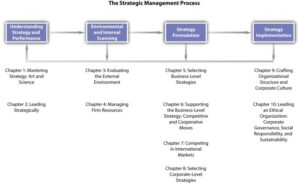
Business data encryption stands at the forefront of modern digital security, acting as a vital shield for organizations navigating an increasingly complex cyber landscape. As data breaches and cyberattacks become more sophisticated, understanding and implementing robust encryption strategies is no longer optional but essential for maintaining trust and integrity in the business world.
This approach not only protects sensitive information but also fosters innovation in business processes, facilitating secure transactions and communications that drive growth and efficiency. From compliance with international regulations to the integration of encryption in day-to-day operations, the importance of this practice cannot be overstated.
Business Data Encryption Overview
In today’s digital landscape, where data breaches and cyber threats are rampant, business data encryption has become a critical line of defense. It ensures that sensitive information remains confidential and secure from unauthorized access. As organizations increasingly rely on digital technologies, the importance of encryption cannot be overstated. Encryption is the process of converting data into a coded format, making it unreadable to anyone who does not have the proper decryption key.
There are various encryption methods used by businesses, including symmetric encryption, asymmetric encryption, and hashing. Each method has its own strengths and applications depending on the specific needs of the organization.
Types of Encryption Methods
Symmetric Encryption
This method uses the same key for both encryption and decryption. It’s fast and efficient for large datasets.
Asymmetric Encryption
Involves a pair of keys — a public key for encryption and a private key for decryption. It enhances security by not requiring the sharing of the decryption key.
Hashing
Converts data into a fixed-size string of characters, which is typically used for verifying data integrity rather than encryption.
Key Components of an Effective Encryption Strategy
An effective encryption strategy should include the following components:
- Risk Assessment: Identifying potential threats and vulnerabilities to determine which data requires encryption.
- Policy Development: Establishing clear policies on data handling and encryption practices across the organization.
- Regular Audits: Conducting regular assessments to ensure compliance with encryption policies and to identify areas for improvement.
Business Innovation and Data Security
Encryption plays a vital role in driving innovation within business processes. By ensuring the security of sensitive data, companies can explore new technological solutions and business models without fear of exposing themselves to cyber threats. Innovative companies like Dropbox and Slack utilize data encryption to enhance the security of their services, enabling users to share information confidently. Their focus on encryption allows them to maintain a competitive edge by building customer trust.
Role of Encryption in Secure Transactions
Encryption facilitates secure business transactions and communications, allowing organizations to conduct business without compromising data integrity. This is crucial in industries such as finance and healthcare, where confidentiality is paramount.
International Business and Encryption Compliance
Complying with international data encryption regulations presents several challenges for businesses operating globally. Each country has its own set of laws governing data protection and encryption, which can complicate compliance efforts.
Important Encryption Standards
Several important encryption standards and regulations include:
- GDPR (General Data Protection Regulation): Enforces strict data protection requirements for businesses operating in Europe.
- HIPAA (Health Insurance Portability and Accountability Act): Requires healthcare organizations to protect sensitive patient information.
- PCI DSS (Payment Card Industry Data Security Standard): Governs the security of payment information for businesses processing credit card transactions.
Strategies for Maintaining Compliance
Organizations can maintain compliance with varying global encryption laws by:
- Staying informed about changes in legislation and encryption standards.
- Implementing a centralized compliance management system.
- Conducting regular training for staff on compliance requirements.
Business Interviews on Data Security
Interviews with experts in data security can provide valuable insights into the significance of encryption for businesses. These discussions often reveal common challenges and best practices in data protection.
Key Interview Questions for Experts
Some questions to consider include:
- What are the most common encryption challenges organizations face today?
- How can businesses effectively educate their employees about encryption practices?
- What role does encryption play in your organization’s overall data security strategy?
Leveraging Encryption Knowledge in Recruitment
Businesses can leverage encryption knowledge during recruitment processes by:
- Assessing candidates’ understanding of encryption technologies and practices.
- Identifying skills related to data protection that are essential for various roles.
Job Search Techniques for Data Security Professionals
For cybersecurity professionals focusing on encryption, effective job search strategies can significantly enhance their chances of landing a desirable role.
Effective Job Search Strategies

Networking
Attend industry conferences and workshops to connect with other professionals and potential employers.
Online Presence
Maintain an updated LinkedIn profile showcasing encryption expertise and relevant experience.
Job Boards
Utilize specialized job boards that focus on cybersecurity roles.
Essential Skills and Certifications
To stand out in the job market, candidates should focus on acquiring essential skills and certifications, such as:
- Certified Information Systems Security Professional (CISSP)
- Certified Encryption Specialist (CES)
- Knowledge of encryption algorithms and protocols.
Business Management and Data Protection
Integrating data encryption into overall business management is crucial for protecting sensitive information and ensuring operational security.
Roles of Management in Data Security
Management plays a pivotal role in fostering a culture of data security. This includes:
- Promoting awareness and training programs on data protection policies.
- Allocating resources for encryption technologies and training.
Importance of Risk Management
Risk management is essential in relation to data encryption practices. Organizations must assess the risks associated with inadequate encryption and develop plans to mitigate these risks effectively.
Marketing Direct and Secure Data Handling
The implications of encryption on direct marketing strategies are significant, particularly in safeguarding customer data.
Managing Customer Data Securely
Methods for securely managing customer data in marketing campaigns include:
- Implementing encryption for customer databases.
- Utilizing secure communication channels for marketing outreach.
Case Studies on Successful Marketing Initiatives
Many businesses have successfully prioritized data security in their marketing initiatives, demonstrating the effectiveness of incorporating encryption into their strategies. These case studies showcase the benefits of building customer trust while maintaining compliance with data protection regulations.
Business Networking and Data Security
When sharing sensitive information in networking environments, best practices must be followed to enhance data security.
Best Practices for Secure Information Sharing
Use of Encrypted Communication Tools
Implement tools that facilitate secure communication to protect shared information.
Establishing Trust Protocols
Develop protocols to verify the identity of individuals before sharing sensitive data.
Networking Strategies Prioritizing Data Security
Networking strategies that prioritize data security include:
- Training team members on secure data handling during networking events.
- Encouraging open discussions about data protection best practices.
Business Outsourcing and Encryption
The importance of encryption in outsourcing partnerships cannot be understated. As businesses increasingly outsource functions, ensuring data security becomes paramount.
Data Security in Outsourcing Functions
Organizations must ensure data security when outsourcing by:
- Conducting thorough assessments of third-party vendors’ encryption practices.
- Implementing contracts that specify data protection requirements.
Evaluating Third-Party Vendors
Guidelines for evaluating third-party vendors based on their encryption practices include:
- Reviewing their compliance with industry standards.
- Assessing their data handling and encryption protocols.
Business Presentations on Data Encryption
Creating a structured presentation on the benefits of data encryption is crucial for communicating its importance to stakeholders.
Key Points to Cover in Presentations
Essential points to include in a business presentation focusing on encryption are:
- The current landscape of data breaches and the need for encryption.
- Case studies of successful encryption implementations.
- The return on investment (ROI) associated with enhanced data security.
Communicating Importance to Stakeholders
Tips for effectively communicating the importance of encryption to stakeholders include:
- Utilizing data and statistics to support claims.
- Highlighting the potential risks and costs of not implementing encryption.
Business Productivity and Data Security
Encryption impacts overall business productivity by necessitating secure data handling practices while maintaining workflow efficiency.
Tools Integrating Encryption
Several tools integrate encryption without hindering workflow, such as:
- Encrypted cloud storage solutions that allow secure file sharing.
- VPN services that offer encrypted connections for remote work.
Balancing Data Security and Operational Efficiency
Organizations can balance data security and operational efficiency by:
- Regularly reviewing data access policies.
- Implementing user-friendly encryption tools that streamline processes.
Restaurant Industry and Customer Data Encryption
In the restaurant industry, the importance of encryption for customer data protection is increasingly recognized.
Successful Implementation of Encryption Practices
Restaurants that have effectively implemented encryption practices demonstrate a commitment to protecting customer information. Examples include:
- Utilizing encrypted payment processing systems.
- Implementing secure reservation platforms that protect customer data.
Impact of Data Breaches on Restaurants
Data breaches can have severe consequences for restaurants, including loss of customer trust and financial penalties. Encryption serves as a critical measure to mitigate these risks.
Resumes and Cover Letters for Cybersecurity Roles

Crafting effective resumes and cover letters is essential for securing positions focused on data protection and encryption.
Creating Effective Resumes
To highlight encryption expertise on resumes, candidates should:
- Include relevant certifications and training.
- Emphasize experience with encryption technologies and projects.
Tailoring Cover Letters for Data Protection Positions
When tailoring cover letters, candidates should:
- Demonstrate understanding of the company’s data security needs.
- Highlight specific achievements related to encryption and data protection.
Business Retail and Payment Data Security
Encryption plays a crucial role in protecting payment information in retail environments.
Commonly Used Encryption Technologies
Common encryption technologies in point-of-sale systems include:
- Secure Socket Layer (SSL) for securing transactions.
- Triple Data Encryption Standard (3DES) for encrypting card information.
Implications of Data Breaches on Retail Businesses
Data breaches can have dire implications for retail businesses, including financial losses and damaged reputations. Implementing robust encryption measures is key to safeguarding against these threats.
Risk Management and Data Encryption Strategies
Inadequate data encryption practices pose significant risks to businesses. Identifying these risks and developing a comprehensive risk management plan is essential.
Developing a Risk Management Plan
Organizations can develop a risk management plan incorporating encryption by:
- Identifying critical assets that require encryption.
- Regularly assessing vulnerabilities and implementing mitigation strategies.
Examples of Effective Risk Management
Organizations that effectively manage risks through encryption demonstrate best practices, such as:
- Adopting a proactive approach to data protection.
- Engaging in continuous monitoring and improvement of encryption strategies.
Business Sales and Secure Client Information
Encrypting client data during sales processes is crucial for maintaining customer trust and compliance with data protection regulations.
Methods for Securely Managing Sensitive Information
Methods businesses can utilize to securely manage sensitive information during sales include:
- Implementing encrypted communication channels for client interactions.
- Utilizing secure document sharing platforms for contracts and proposals.
Case Studies of Successful Sales Strategies
Highlighting case studies that showcase successful sales strategies with a focus on data protection can provide valuable insights into effective practices.
Sales Management and Encryption Practices
Sales managers play a vital role in implementing encryption policies within their teams to enhance data security.
Training Needs for Sales Personnel
Sales personnel require training on data security best practices, including:
- Understanding the importance of encryption in protecting client information.
- Recognizing the potential risks associated with inadequate data protection.
Checklist for Secure Data Handling
A checklist for sales teams to follow for secure data handling can include:
- Always use encrypted channels for client communications.
- Regularly update software and encryption tools.
Sales Teleselling and Information Protection
Securing customer information during teleselling is critical for compliance and customer trust.
Best Practices for Securing Customer Information
Best practices for securing customer information during teleselling include:
- Using encrypted telecommunication tools.
- Implementing strict data handling protocols for customer information.
Compliance Issues Related to Customer Data
Compliance issues related to customer data in teleselling can arise from inadequate encryption practices, making it essential for organizations to adopt robust measures.
Sales Training on Data Security
Developing a training program focused on data encryption for sales teams is essential in today’s data-driven environment.
Key Topics for Training Sessions
Key topics to cover in training sessions related to data protection can include:
- The fundamentals of encryption and its importance.
- Overview of compliance regulations and standards.
Resources for Ongoing Education
Organizations should identify resources for ongoing education on encryption in sales environments, such as:
- Online courses and certifications.
- Industry webinars and workshops.
Business Security and Encryption Integration
Encryption fits into the broader context of business security, enhancing the overall integrity of data protection strategies.
Role of Cybersecurity Frameworks
Cybersecurity frameworks play an essential role in enhancing encryption practices by providing structured approaches to data protection.
Checklist for Assessing Encryption Readiness
A checklist for businesses to assess their encryption readiness can include:
- Evaluating current encryption policies and technologies.
- Identifying gaps in encryption practices and potential areas for improvement.
Small Business Strategies for Data Encryption
Implementing practical encryption solutions is crucial for small businesses looking to protect sensitive information.
Costs and Benefits of Implementing Encryption
Small businesses should consider the costs and benefits of implementing encryption, which can include:
- Initial investment in encryption technology and training.
- Long-term savings from avoiding data breaches and maintaining customer trust.
Resources for Small Business Owners
Small business owners can access various resources to educate themselves on encryption, including:
- Government websites offering guidance on data protection.
- Online forums and communities focused on cybersecurity for small businesses.
Solo Professionals and Data Protection
For solo professionals, handling sensitive information responsibly is crucial for maintaining customer trust and business integrity.
Encryption Tools for Solo Professionals
Suitable encryption tools for solo professionals include:
- End-to-end encrypted messaging apps for client communications.
- Secure file storage solutions that encrypt sensitive documents.
Managing Personal Data Encryption
Strategies for managing personal data encryption effectively include:
- Regularly updating encryption software to ensure the latest security features.
- Educating clients about data protection measures in place.
Strategic Planning for Data Encryption Implementation
Developing a strategic plan for data encryption is essential for integrating it into an organization’s overall security framework.
Aligning Encryption Initiatives with Business Goals
Organizations should align encryption initiatives with business goals by:
- Identifying key business processes that require data protection.
- Ensuring that encryption strategies support overall business objectives.
Evaluating Success of Encryption Strategies
Metrics to evaluate the success of encryption strategies can include:
- The rate of data breach incidents before and after implementing encryption.
- Employee compliance with data protection policies.
Team Building and Data Security Awareness
Fostering a culture of data security within teams is vital for ensuring effective encryption practices.
Team-Building Activities Focused on Data Security
Organizations can implement team-building activities that emphasize data security, such as:
- Workshops on the importance of encryption and data protection.
- Simulations of data breach scenarios to educate employees on response strategies.
Enhancing Team Awareness of Encryption Practices
Methods for enhancing team awareness regarding encryption practices can include:
- Regular updates on emerging threats and encryption technologies.
- Encouraging open discussions about data handling practices.
Venture Capital and Data Security Investments
Attracting venture capital often hinges on a startup’s commitment to data security, particularly through encryption.
Enhancing Value Proposition with Encryption
Encryption can enhance the value proposition of startups by:
- Demonstrating a commitment to protecting customer data.
- Building trust with potential investors through robust security measures.
Successful Ventures Prioritizing Data Security
Examples of successful ventures that prioritized data security include:
- Companies like Signal and ProtonMail that have built their reputation on strong encryption practices.
- Startups that have successfully secured funding through transparent encryption policies.
Workplace Communication and Encryption
Secure workplace communication involving sensitive data is vital in today’s remote work environment.
Best Practices for Secure Communication
Best practices for secure workplace communication include:
- Utilizing encrypted email and messaging platforms.
- Regularly updating passwords and access controls.
Creating Policies for Secure Data Sharing
Guidelines for creating policies on secure data sharing in the workplace should encompass:
- Defining acceptable use and data handling practices.
- Establishing clear procedures for reporting data breaches or suspicious activities.
Workplace Safety and Data Security
Workplace safety and data encryption practices intersect in ensuring a secure environment for data handling.
Ensuring a Secure Working Environment
Methods for ensuring a secure working environment for data handling include:
- Implementing physical security measures alongside digital security protocols.
- Conducting regular safety drills focusing on data protection practices.
Case Studies on Integrating Safety and Security
Businesses that successfully integrate safety and security protocols demonstrate best practices that can be adopted across various industries.
Final Summary
In conclusion, the implementation of business data encryption is crucial for safeguarding sensitive information and enhancing overall business resilience. By prioritizing security and compliance, organizations can not only protect their assets but also unlock new opportunities for growth and innovation. The future of business lies in its ability to secure data effectively, ensuring peace of mind for both companies and their clients.
Clarifying Questions
What is business data encryption?
Business data encryption is the process of converting sensitive information into a secure format to prevent unauthorized access.
Why is encryption important for businesses?
Encryption is critical for protecting customer data, maintaining compliance with regulations, and preventing data breaches.
What types of encryption methods are commonly used?
Common methods include symmetric encryption, asymmetric encryption, and hashing algorithms.
How can businesses ensure compliance with encryption regulations?
Businesses can stay compliant by regularly updating encryption practices, training staff, and following international standards.
Are there specific encryption tools recommended for small businesses?
Yes, tools like VeraCrypt and BitLocker provide effective encryption solutions tailored for small business needs.




